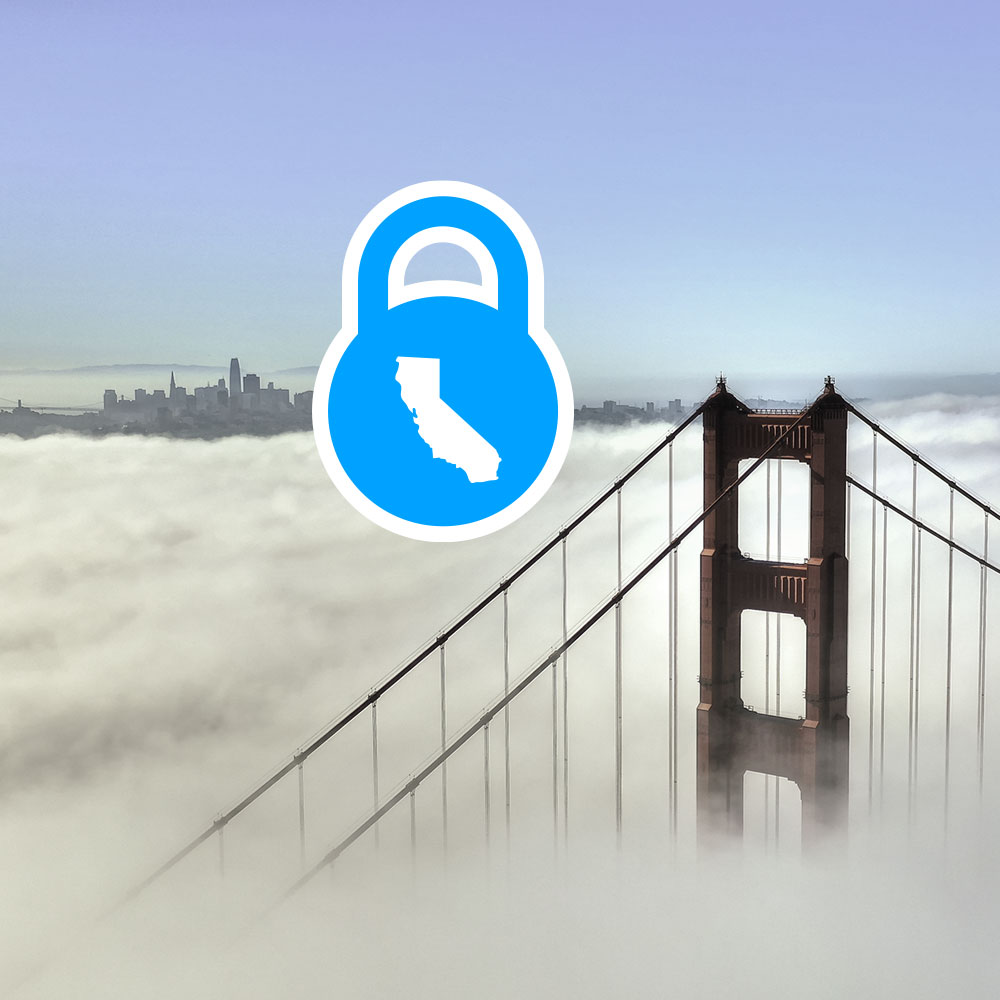The ever expanding number of data privacy laws — and their often lengthy and varied lists of requirements — means that a manual approach to meeting and monitoring compliance outcomes is virtually impossible.
To stay ahead of the curve and avoid potential consequences of breaching these regulations, you need effective compliance management software. These tools are key to building privacy compliance into your day to day business practices and managing risk.
We’ve reviewed six tools that can help you streamline your compliance efforts and optimize your data privacy outcomes, so you can select the ideal compliance management software for your business.
When making our selection, we’ve considered factors like consent management features, analytics, and reporting capabilities.
| Compliance management software | Key features | Usability score* | Pricing |
|---|---|---|---|
| Usercentrics | Robust analytics and reporting Geolocation +2,200 legal templates Cross-domain and cross-device consent | 4.5 (Capterra) | From USD 8/month |
| consentmanager | EU servers Automatic cookie deletion Time-adjustable re-consent | 4.1 (Capterra) | Free version available, paid tiers from USD 25/month |
| iubenda | Consent Database Data processing activities register Policy generators | 4.7 (Capterra) | From USD 3.99/month, 14-day money-back guarantee |
| Didomi | Multi-regulation CMP Global Privacy Control Consent versions and proofs | 4.5 (Capterra) | Pricing available on request |
| Osano | Data mapping Cookie Consent Regulatory updates | 4.6 (G2) | Free plan available, Plus plan priced at USD 199/month |
| Cookie Information | Data Discovery Compliance dashboard Customer journey analytics | 4.8 | From EUR 15/month |
*Ease of use scores found via Capterra and/or G2 user reviews
Why are compliance management tools a must in 2024?
Compliance management software enables businesses to comply with data privacy laws by automating tasks once implemented and monitoring regulatory changes. These tools help ensure the process is seamless, requires limited resources, and enable organizations to offer granular consent management options to users.
Failure to adhere to the rules set by various data privacy laws can result in fines. What’s more, the reputational damage that results from noncompliance can lead to a loss of customer trust that can be even more damaging in the long term.
However, you need access to consented data to launch successful marketing initiatives, improve products, and provide the kinds of personalized experiences customers expect. A compliance management solution provides users with the transparency and control they require while meeting compliance criteria and securely storing data according to regulatory requirements.
By automating and streamlining compliance tasks, these specialized tools make compliance easier while reducing the risk of human error.
Our picks for 6 top compliance software tools
Collating a cookies checklist or data privacy to-do list are just two requirements for companies seeking to become privacy-compliant with relevant regulations. This can be extra challenging for smaller organizations with limited resources. Fit-for-purpose software can help you minimize the burden of achieving and maintaining compliance.
1. Usercentrics
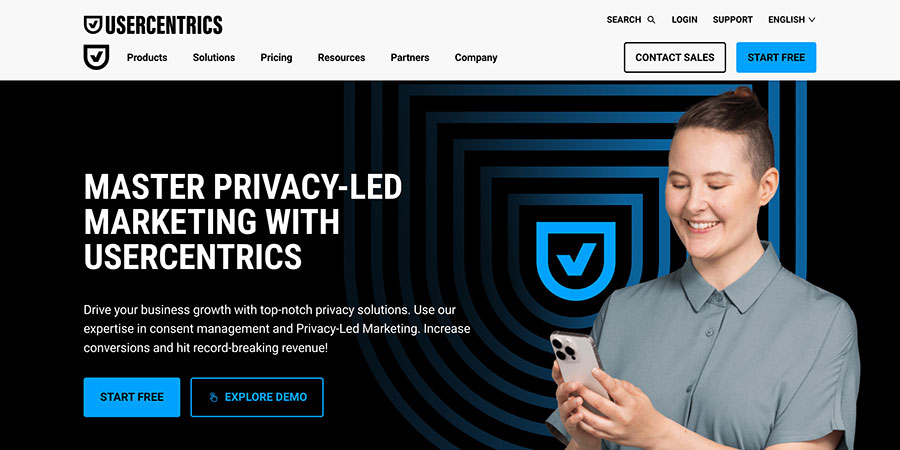
Usercentrics CMP is an industry-leading consent management tool that equips businesses to manage both website and application consent via one interface.
Easily customized consent banners enable granular consent management, which helps organizations stay compliant while delivering a consistent and branded user experience. Interaction Analytics enable businesses to see how users are engaging with consent banners so they can optimize opt-in rates.
Usercentrics is a powerful platform, so there may be a bit of a learning curve for non-technical teams looking to master its more advanced features. That said, there are plenty of useful resources online, and the customer support team is always available to help with troubleshooting.
Key features
- Granular consent management: Give users complete control over the data they share across domains and devices in just a few clicks.
- Robust analytics and reporting: Get detailed information about cookie acceptance rates to enable informed decision-making.
- A/B testing tools: Gain valuable insights into user behavior to optimize your CMP and consent rates.
- Data Processing Service (DPS) Scanner: Identify all third-party technologies that are collecting customer data from your website and block them until consent is obtained.
- Google-certified CMP: Comply with Google’s EU user consent policy requirements and integrate with Google Consent Mode v2 by default.
- Geolocation: Serve users consent notices that meet the requirements of their jurisdiction’s data privacy laws based on their location.
Usercentrics pricing
Usercentrics offers a free 14-day trial, after which users can sign up for one of the following paid plans.
- Essential: USD 8/month for up to 1,500 sessions
- Plus: USD 16/month for up to 3,000 sessions
- Pro: USD 34/month for up to 15,000 sessions
- Business: USD 56/month for up to 50,000 sessions
- Corporate: Custom pricing
| Pros | Cons |
|---|---|
| 2,200+ legal templates | Analytics data only available for 90 days |
| Consent management for websites, mobile apps, and connected TVs | |
| 60+ languages supported |
2. consentmanager
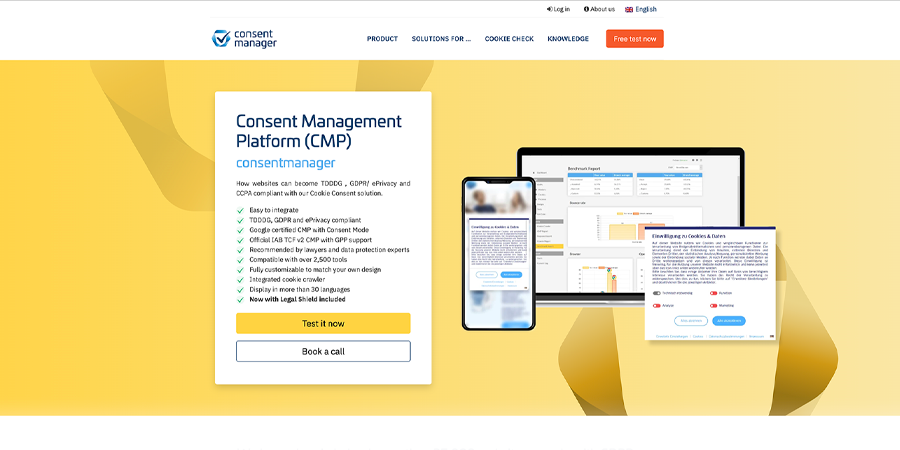
consentmanager promises to help businesses increase their cookie acceptance rates by giving users access to in-depth reporting and intelligent A/B testing tools. However, with its main focus on the GDPR, the platform may not be the best option for businesses with global operations.
Key features
- EU servers: Store user consent records on servers located in the EU.
- Automatic cookie deletion: Remove cookies when users reject tracking.
- Time-adjustable re-consent: Set intervals for users to reconfirm tracking consent.
consentmanager pricing
- Free: USD 0 for up to 5,000 pageviews/month on one website.
- Starter: USD 25/month for up to 100,000 pageviews/month on one1 website.
- Essential: USD 64/month for up to 1 million pageviews/month on 3 websites or apps.
- Professional: USD 237/month for up to 10 million pageviews/month on 20 websites or apps.
- Ultimate: Custom pricing based on demand.
| Pros | Cons |
|---|---|
| Consent management for website, mobile apps, connected TVs | No geolocation capabilities |
| GDPR-compliant servers | |
| Integrated cookie checker |
3. iubenda
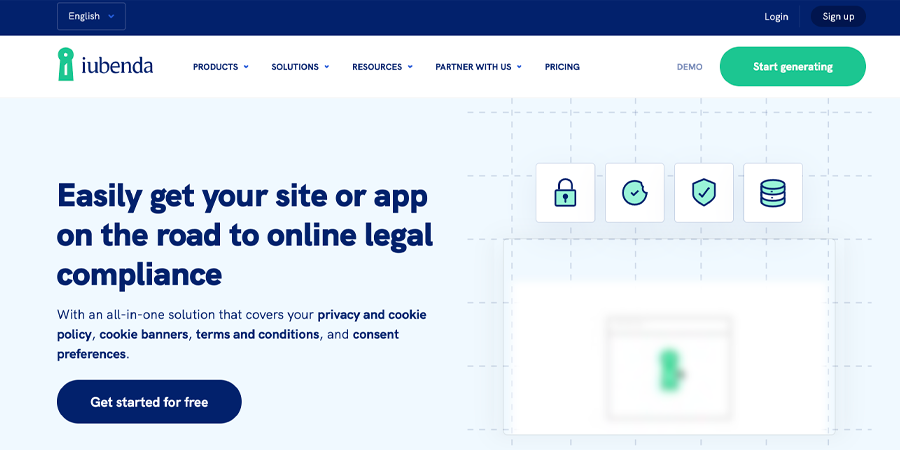
iubenda provides online legal compliance tools to help ensure your website and apps are compliant with laws across multiple jurisdictions. While it’s a Google-certified CMP partner, not all GDPR and CCPA compliance features are available in every plan.
Key features
- Consent Database: Access and review consent records via a user-friendly database.
- Data processing activities register: Document how you store and use the data you collect from your website and app visitors.
- Policy generators: Easily generate and manage privacy and cookie policies that comply with main international laws.
iubenda pricing
- Starter: USD 3.99/month per site or app
- Essentials: USD 6.99/month per site or app
- Advanced: USD 27.99/month per site or app
- Ultimate: USD 119.99/month per site or app
| Pros | Cons |
|---|---|
| “All-in-one” solution for policies, consent, and preference management | Only 11 languages available on consent banners |
| Customizable cookie and privacy policies | |
| Automatic cookie classification |
4. Didomi
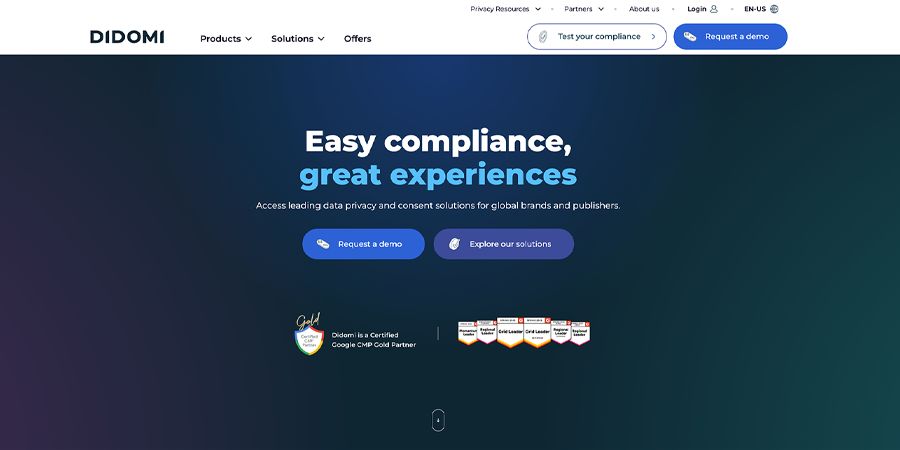
Didomi is a cloud-based CMP that the company touts as seamlessly integrating into businesses’ existing tech stacks to make it easier to achieve compliance with major data privacy laws. You’ll need to go through a consultation process to establish which tools will meet your needs.
Key features
- Multi-regulation CMP: Geotargeted consent banners tailored to user location.
- Global privacy control: Implement appropriate data collection measures based on users’ previous consent choices.
- Consent versions and proofs: Track consent history across various versions of notices to see what users agreed to at any point in time.
Didomi pricing
Contact Didomi for pricing for Content Essentials, Core Privacy UX, and Privacy UX Plus plans.
| Pros | Cons |
|---|---|
| APIs and SDKs for seamless integration with existing infrastructure | Opaque pricing |
| Granular consent controls | |
| Customer support via live chat and email |
5. Osano
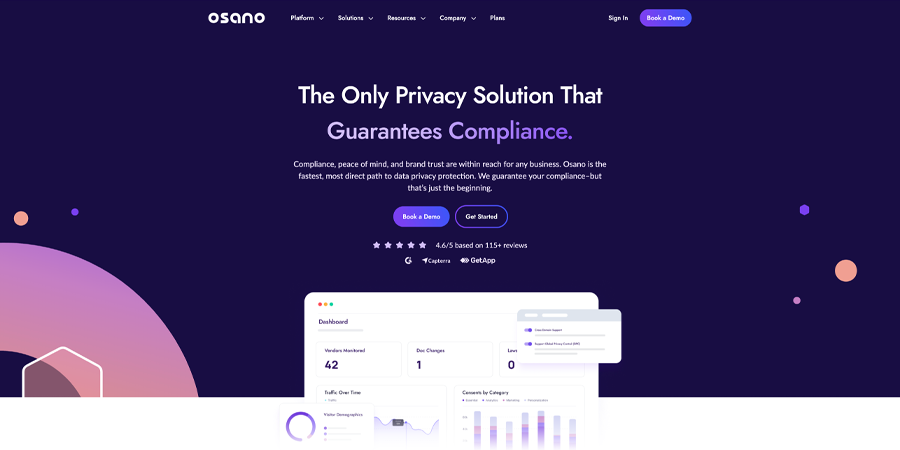
Osano offers a unified consent and preference hub. Although it has some powerful features, some users note that customization options are limited.
Key features
- Cookie Consent: CMP for complying with regulations in over 50 countries.
- Data mapping: Generate visualizations of your data collection and processing practices to help identify potential risks and opportunities.
- Regulatory updates: Receive notifications about changes to the data privacy laws and regulations applicable to your business.
Osano pricing
Osano has two self-service cookie consent packages:
- Free: USD 0/month for 1 user, 1 domain, and up to 5,000 visitors/month
- Plus: USD 199/month for 2 users, 3 domains, and up to 30,000/month
Contact Osano for pricing for their custom solutions.
| Pros | Cons |
|---|---|
| $500,000 “No Fines, No Penalties” Pledge | Users report limited customization and limited features for the price points |
| Free option | |
| Data stored on blockchain |
6. Cookie Information
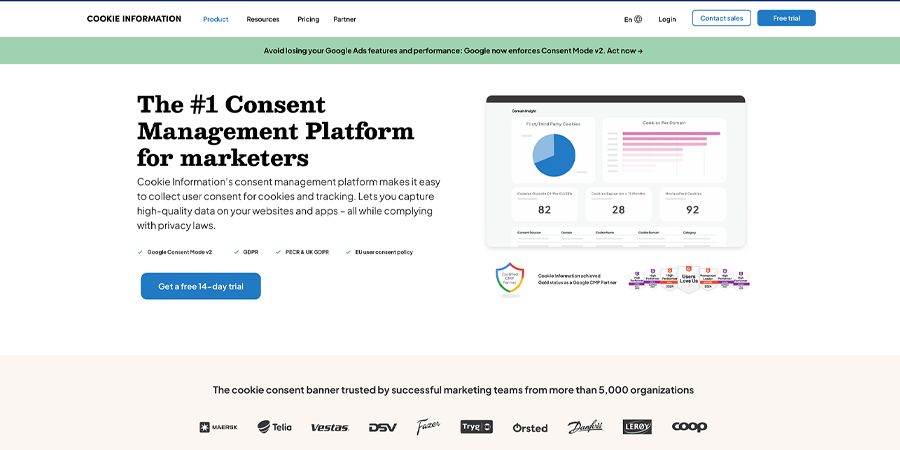
Cookie Information equips businesses with the tools they need to deploy cookie banners and privacy notices that comply with the GDPR, CCPA, and other data privacy laws. However, some users note they would like more customization options.
Key features
- Data discovery: Find and flag data management practices that don’t comply with your organization’s policies.
- Compliance dashboard: Mitigate risks by tracking compliance with the GDPR and ePrivacy Directive across your entire digital portfolio from one place.
- Customer data platform: Segment data to create custom audiences and serve personalized adverts to data subjects.
Cookie Information pricing
- Essential: From EUR 15/month/domain
- Professional: From EUR 34/month/domain
| Pros | Cons |
| Free 14-day trial | Some users note the tool is expensive for what it offers, and cancellation is difficult |
| Robust analytics | |
| Daily and weekly website scans |
Choosing the right compliance management tools
Whether you need to achieve GDPR or CCPA compliance, selecting the right compliance management tool is crucial.
A reliable solution will help you continuously meet the requirements of applicable laws while avoiding the risks associated with noncompliance.
Compliance processes you should consider
The actions your business will need to take in relation to data collection and processing will depend on the jurisdictions where your audiences are located.
Here are a few of the most important regulations to keep in mind, along with their main requirements.
- General Data Protection Regulation (GDPR): Obtain explicit consent for collecting and processing data from users in the EU, no matter where your business is located.
- California Consumer Privacy Act (CCPA): Enforce California users’ right to know what data you’re collecting, as well as the right to opt out of data sales.
- Lei Geral de Proteção de Dados (LGPD): Obtain Brazilian users’ explicit consent for data collection and enforce their rights to access, correct, and delete that information.
- Protection of Personal Information Act (POPIA): Secure South African data subjects’ consent for data processing and provide transparency about data usage.
- Federal Act on Data Protection (FADP): Ensure transparent, lawful, and purpose limited collection and processing of Swiss users’ data.
Factors to consider when choosing a compliance management tools
Compliance management tools make it easier to comply with multiple data privacy laws simultaneously. The platform you choose should enable you to:
- Obtain explicit, informed consent
- Enable multi-jurisdictional compliance
- Maintain detailed records of consent and data processing activities
- Protect user data from being transferred to unauthorized third-party recipients
- Ensure audit preparedness
Usercentrics CMP is a robust data compliance management solution that enables you to offer your users location-driven and granular consent management options.
The platform comes with functionality to streamline compliance processes by reducing the amount of manual input required to increase opt-ins, maintain consented data, and meet rigorous compliance requirements.
In addition to enabling compliance with international regulations and frameworks, Usercentrics is Google-certified and comes integrated with Google Consent Mode v2, so you can continue with digital advertising in the EU, UK, and Switzerland uninterrupted.
This helps you to ensure your users can effectively signal and manage their consent in a way that complies with Google’s requirements under the Digital Markets Act (DMA) and the updated EU user consent policy.
Potential noncompliance risks
Data management and compliance are becoming increasingly important, and not just because of the financial risks that come from falling short of legal requirements.
Fines and penalties
Most data privacy regulations impose hefty fines on businesses that don’t comply. For example, under the GDPR, businesses can be fined up to EUR 20 million or 4 percent of the global annual turnover, whichever is higher, for repeat or more serious offenses.
Loss of market share
Consumers are increasingly aware of their data privacy rights and prefer to engage with businesses that prioritize and enforce them. Failure to comply with data privacy laws can reduce customer trust and result in a loss of market share.
Legal actions
Individuals and groups affected by incidents that flow from noncompliance, such as data breaches, can decide to take legal action against a business under some laws.
Regulatory scrutiny
Persistent failure to adhere to data privacy regulations or severe violations of these laws may attract increased scrutiny from regulatory bodies. This can result in closer monitoring and more frequent audits and documentation requirements, which may inflate ongoing compliance costs and resource demands.
Operational disruptions
Audits, investigations, and other adverse events that result from noncompliance can disrupt your business operations, including orders to cease certain operations and/or delete data. This can make it difficult to do business effectively and to grow.
Who should be responsible for compliance operations within an organization?
Data privacy laws affect every department in your organization. From the importance of consent management for digital marketers to compliance-related tasks for human resources and customer service, dedicated compliance officers, like a Data Protection Officer (DPO) or management teams should oversee compliance across the company.
However, if you want to minimize manual effort — and the risk of errors that comes along with it — these individuals shouldn’t be left to manage compliance operations on their own. Equip them with a robust compliance management tool to help teams to stay up to date with evolving laws and business requirements and reduce the complexity involved.
Using compliance management software to consolidate activities and automate tasks can optimize your team’s output and enable your organization to remain proactive while minimizing the risks associated with noncompliance.
Usercentrics CMP for streamlined compliance processes
Failing to comply with data privacy laws can lead to hefty fines, reputational damage, and legal actions that can negatively affect your organization’s bottom line.
When it comes to achieving and maintaining compliance, Usercentrics’ CMP offers dynamic and comprehensive consent management tools that help you adhere to the numerous data privacy regulations in effect across the globe.
By streamlining the collection and management of user consent and making it easier to track regulatory changes, Usercentrics helps businesses in 195 countries to achieve and maintain privacy compliance.



